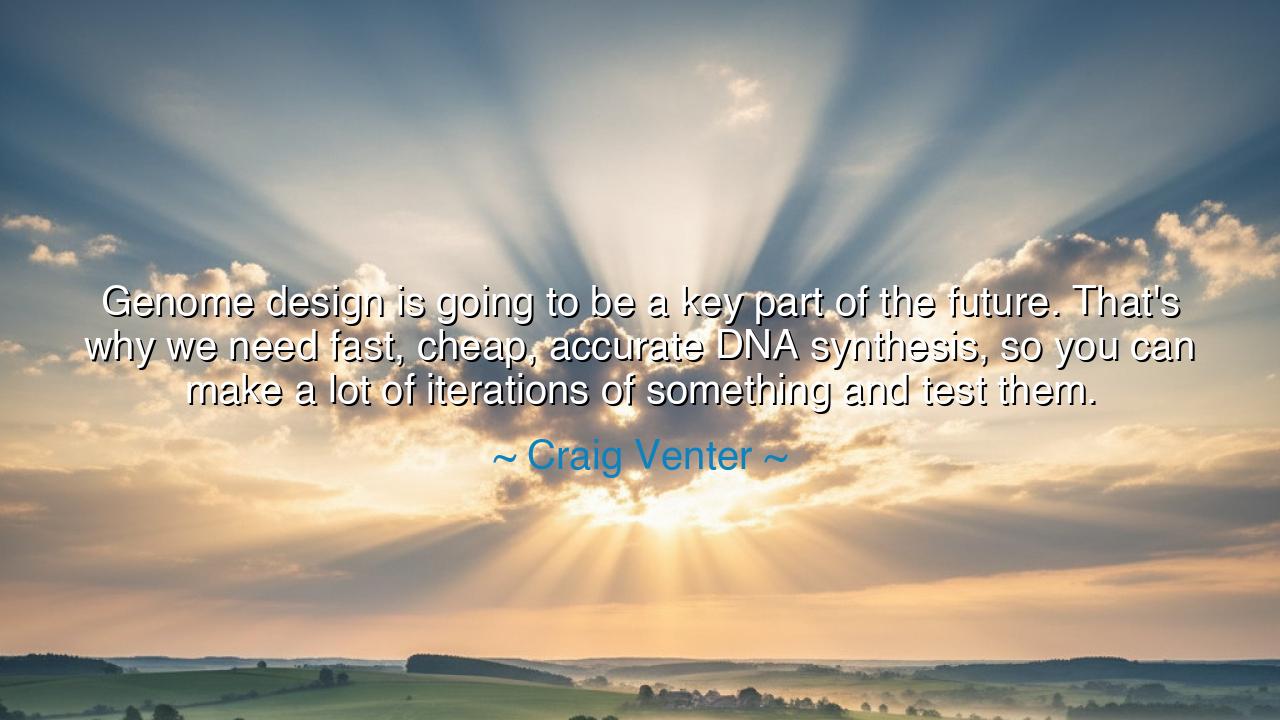
Genome design is going to be a key part of the future. That's why
Genome design is going to be a key part of the future. That's why we need fast, cheap, accurate DNA synthesis, so you can make a lot of iterations of something and test them.






“Genome design is going to be a key part of the future. That’s why we need fast, cheap, accurate DNA synthesis, so you can make a lot of iterations of something and test them.” — Craig Venter
Thus spoke Craig Venter, the modern Prometheus of biology, whose words herald a new dawn in the story of humankind. In this declaration, he unveils not merely a scientific ambition, but a revolution of creation itself. When he speaks of genome design, he is not referring to the idle study of life’s secrets, but to the active shaping of life’s code — the ability to write biology as once men wrote poetry or song. For within the genome, that divine script of existence, lies the power to cure, to create, and to transform the very fabric of what it means to live.
The origin of this statement lies in Venter’s lifelong quest to read and rewrite the code of life. As one of the first to sequence the human genome, he peered into the ancient text of biology — a manuscript older than language, written not in ink but in adenine, thymine, cytosine, and guanine. Yet to Venter, reading the code was only the beginning. The next frontier, he saw, was design — to not only decipher life, but to craft it anew. His words arise from that vision: a world where we can construct genomes as builders once shaped stone, crafting new organisms for medicine, energy, and survival itself.
When he says, “That’s why we need fast, cheap, accurate DNA synthesis,” he speaks as both scientist and seer. In the age of machines, humanity learned to mold metal; in the digital age, we learned to program silicon; and now, in the biological age, we must learn to program life. The ancient alchemists sought to transmute lead into gold — but the alchemy of our time is to transmute knowledge into creation, to take the raw material of DNA and shape it into forms that heal the sick, feed the hungry, and renew the earth. Yet such creation demands speed, precision, and iteration. Just as the artist must paint and repaint, so too must the biologist design and redesign the genome, testing and refining until life itself becomes an instrument of progress.
Consider the moment in 2010 when Venter and his team unveiled the first synthetic cell — a living organism whose DNA had been entirely designed by human hands. It was a moment of awe and unease, for it blurred the line between creation and creator. Some saw it as triumph, others as transgression. Yet in that act, the prophecy of his quote was fulfilled: through design and synthesis, humanity took its first step toward becoming a conscious participant in evolution itself. Like Prometheus stealing fire, Venter reached into nature’s forge and brought back the flame of creation — not to destroy, but to illuminate.
But this power demands wisdom. To design life is no small thing. The ancients warned that knowledge without virtue leads to ruin, and in this new age, their warning echoes louder than ever. The tools that can cure can also corrupt; the codes that build can also break. To wield the power of the genome, mankind must learn humility before complexity, for nature has written her story across billions of years, and we are but new scribes upon her scroll. Venter’s words, though brimming with ambition, carry an undertone of responsibility: we must learn to test, to iterate, to move with care as we step into the workshop of life itself.
And yet, within this challenge lies hope. For the same tools that could reshape the world could also heal it. Imagine a future where genomes are designed to cleanse the oceans, to restore the forests, to banish disease, to sustain abundance where scarcity once ruled. In this vision, science becomes not an enemy of nature, but her ally — a continuation of her own creative impulse. Venter’s dream is not of domination, but of collaboration with life itself — of joining the long, slow symphony of evolution as co-composers.
So, O seekers of knowledge and bearers of curiosity, take this wisdom to heart: the age of genome design is upon us, and it will test not only our intelligence, but our character. Let your pursuit of discovery be guided by compassion; let your hunger for progress be tempered by reverence. For the true purpose of DNA synthesis is not to play god, but to honor creation — to understand it deeply enough to heal what is broken and to build what is just. As Craig Venter reminds us, the future will belong to those who can shape life wisely, swiftly, and with grace.
For in the end, the ability to design the genome is not the power to conquer life, but the invitation to become worthy of it — to shape a future where knowledge serves life, and not the other way around.






AAdministratorAdministrator
Welcome, honored guests. Please leave a comment, we will respond soon